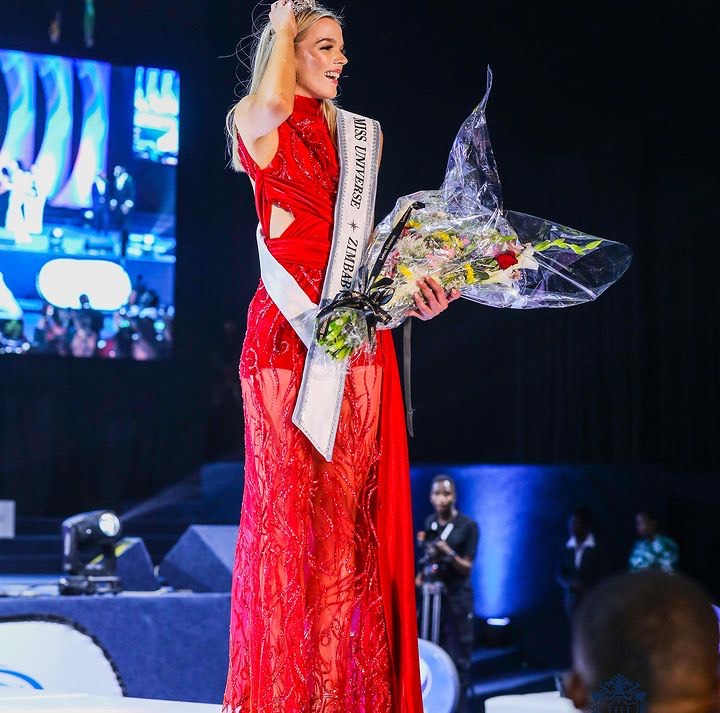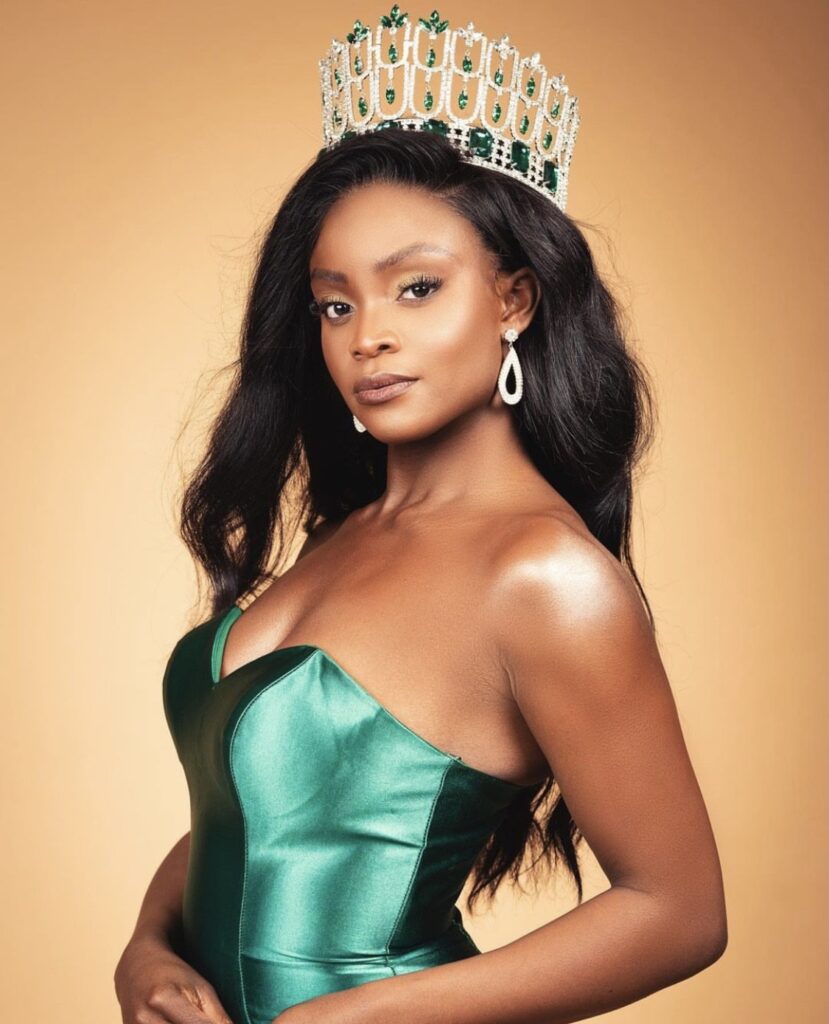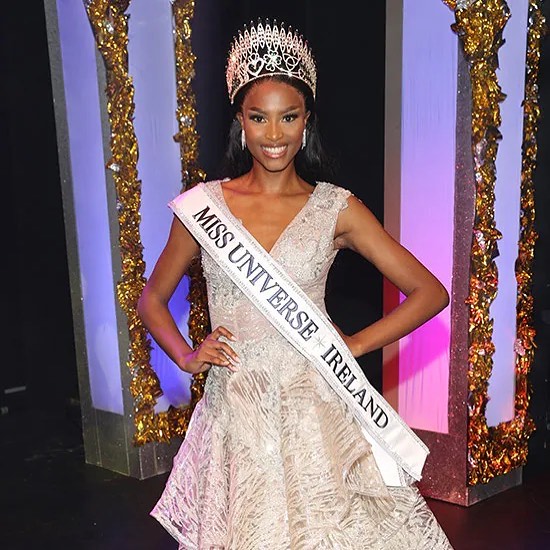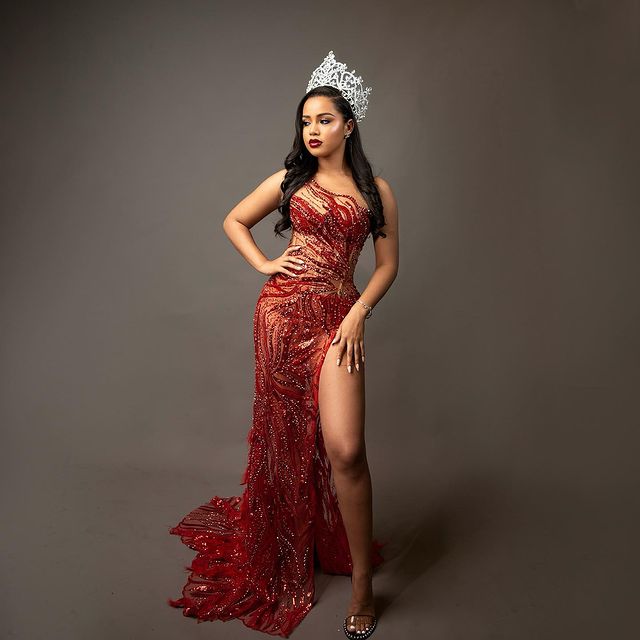One lens through which Bruk-Jackson’s victory is viewed is as a representation of privilege and a potential continuation of the historical narrative of favouring white individuals. It is not that her win is inherently undeserved, but rather that it can be seen as reflecting a broader societal issue which has left deep-seated scars in many African countries.
By Joy Chukwujindu
Holding up her crown in one hand and bouquet in the other, Brooke Bruk-Jackson, the newly crowned Miss Universe Zimbabwe, stood out in many ways at the Harare Hippodrome Auditorium, not just for the captivating red evening dress, but also for her straight blonde hair, and the golden hues of her skin. Bruk-Jackson’s name was etched in history on September 16, 2023, as the first white woman to win Miss Universe Zimbabwe, and she is set to represent the country in El Salvador at the 2023 Miss Universe international competition. This moment has triggered a wave of controversies among Africans and Blacks across the world, and spurred discussions about the participation of white women in national beauty contests within Africa, particularly when they represent the nation on a global stage.
Pageant queens have often subtly been considered the hallmark of beauty and elegance, and in a country where the majority boasts Southern African features — dark or brown eyes, curvy bodies, afro hair, and most importantly, dark skin — some argue that European features should not be the benchmark for Zimbabweans to aspire to. Many perceive this as potentially enabling Eurocentric beauty standards, which emphasise slender noses, svelte figures, straight hair, and lighter eyes and skin. On the opposing side of this controversy, there are staunch supporters of Bruk-Jackson who firmly argue that Africa stands out for its remarkable ethnic and racial diversity. They have accused the critics of being racists, and that a white Zimbabwean woman is no less Zimbabwean than her melanated counterparts.

Beyond the lineups of women strutting in heels, donning exquisite gowns, and vying for glittering crowns, women’s beauty pageants have regularly stirred up a whirlwind of controversies, ranging from the troubling objectification of women for the male gaze to the portrayal of unrealistic beauty standards, along with a conspicuous absence of diverse ethnicities and body types. The exclusion and underrepresentation of Black women have often been a subject of concern as the beauty industry has tended to lean towards a predominantly white-centric view of beauty, sidelining dark-skinned women and making it a rarity to see them securing pageant titles, striding the fashion runways or gracing magazine covers. The beauty industry’s historical and social underpinnings reveal a systemic exclusion of Black women, clearly reflecting the pervasive influence of white supremacy.
(Read also: 15 Emerging African Designers Breaking Through Mainstream Fashion)
However, in recent years, beauty pageants have been building bridges between different worldviews and belief systems and have evolved in various ways, with transgender women now claiming titles and plus-size women participating in beauty contests tailored for them. Whether we rewind to the glamorous 1970s or fast-forward to the glitzy 2020s, the sight of Black women taking the crown in beauty pageants stood out as a groundbreaking achievement that captured not just the headlines, but the hearts of observers due to its rarity. In pageantry, women of colour were sparsely represented and it was not until 1970 that African American, Jennifer Hosten, won the Miss World title. As the clamour for Black representation grew, black models began to slowly take centre stage, setting new records on fashion runways, magazine covers, and beauty pageants. Not only did Black women clinch beauty titles, but Black women of African descent won three out of the Big Four international beauty pageants; Nigerian Agbani Darego won the 51st edition of Miss World in 2001, marking the first Black African to win, Botswana’s beauty queen, Mpule Kwelagobe won the Miss Universe 1999 title, as the first Black African woman to achieve this, and Kenyan model, Winifred Adah Omwakwe, became Miss Earth titleholder in 2002. For national beauty titles, Black African women have made similar feats, South African-born Nigerian-Irish model, Pamela Uba, won the national beauty pageant, Miss Ireland in 2021, and represented Ireland at the 2021 Miss World, and recently in Ireland, Aishah Akorede emerged as the winner at the Miss Universe Ireland. Bruk-Jackson and Akorede will be competing at the same international event, facing comparable situations where they do not share the predominant skin tone of their respective countries.


Without a doubt, an African woman of European descent winning the pageant in Africa is just as much a rarity. But understandably, hers could be received differently than her Black counterparts from White-dominated countries. One lens through which Bruk-Jackson’s victory is viewed is as a representation of privilege and a potential continuation of the historical narrative of favouring white individuals. It is not that her win is inherently undeserved, but rather that it can be seen as reflecting a broader societal issue which has left deep-seated scars in many African countries.
(Read also – To Boycott or Not to Boycott: Miss South Africa 2021 Takes on Her Nation, and Wins?)
In this era of multiculturalism and multiracial coexistence, Africa’s multiracial composition is not a random occurrence or solely a result of migration. It is deeply rooted in Africa’s complex history, notably its experiences with colonialism with Europeans. As we find ourselves firmly in the post-colonial era, there’s been a transformative shift in the status of white populations in Africa – once dominant in positions of power, they now can be regarded as a minority group. In the past, Black women who have secured victories in pageants have benefited from the ongoing efforts towards inclusivity and diversity, but their white counterparts do not enjoy the same level of favourable reception among Africans and Blacks alike, due to the unfortunate involvement of their ancestors in the historical subjugation, conquest and discrimination of Africans and Blacks alike.
It is no surprise then, that Bruk-Jackson’s win is perceived as a triumph for the White African community alone, and the accusation of Africans being racist towards white women winning any African national title could be misleading; racism is a pervasive, a deeply entrenched problem within society affecting people’s opportunities and how they are treated. And white women have never fit into the racism spectrum discourse.
It is in a similar manner that when beauty queens with lighter skin tones secure African national titles — regardless of whether they hail from African or mixed racial backgrounds — within a contest composed of women with darker complexions, their victory is seen as lacking in authenticity. But instead, as a result of favouritism or privilege stemming from their skin tone.
Amid the Miss Universe Zimbabwe 2023 furore, an Internet video circulated, featuring Miss Aura Nigeria, Lydia Balogun, a Nigerian-Mexican beauty, elegantly striding alongside other beauty queens at the annual beauty pageant, Miss Aura International 2023. Once again, passionate debates erupted around the stark contrast in skin tones between Miss Aura Nigeria and Miss Aura Ghana, which has pushed viewers to believe that there is a trend within Nigerian beauty competitions where judges usually swoon over light-skinned contestants and overlook the others with Afrocentric beauty, leaving only light-skinned winners.

One cannot dismiss the ingrained challenges of colourism within the beauty industry where light-skin privileges are prevalent and dark-skinned are prejudiced against. A country like South Africa, for example, which boasts a substantial white and biracial population has been affected by colourism and shockingly, since the competition’s inception in 1956 during the Apartheid era, South Africa only ushered its first black Miss South Africa, Jacqui Palesa Mofokeng, in 1993.
However, the unfolding narrative towards Bruk-Jackson and Balogun is a form of prejudice, too, where there is prejudicial treatment against light-skinned women while their melanin-rich counterparts garner sentiments of the public, who are actively cheering for their potential success. However, this form of prejudice is not deeply ingrained in institutions and does not have the same weight as the visibly systemic oppression faced by dark-skinned women.
(Read also: Is there a Parallel Between the Skin Epidemic and Colourism in Africa that is Being Overlooked?)
But all things considered, standing as the most diverse continent, Africa is home to distinct ethnic groups. White Africans of European descent are just as integral to the continent’s rich ethnic tapestry, and to overlook these ethnic realities would be akin to dismissing the nationality of Africans living in other European countries. Nationality, after all, is not solely dependent on one’s skin colour; each nation has its unique set of laws governing citizenship acquisition, including factors like descent, naturalisation, and birth. These laws reflect the idiosyncrasies and historical contexts of each nation, reinforcing the idea that diversity and inclusion extend beyond mere appearances. Take for instance, Nigerian-Mexican, Lenaura Blessing Ifeoma Chukwu, who clinched the title of Miss Nayarit 2020, and represented the state at the Miss Mexico pageant, potentially securing her participation in the Miss World pageant. Chukwu’s victory brought much-needed attention to the under-represented Afro-Mexican minority ethnic group.
In addition to being a Zimbabwean, Bruk-Jackson also meets the prerequisites for competing, and if she was chosen to compete, she possessed the right, equivalent to any other competitor, to vie for the crown. Throughout the event, her palpable confidence while gracefully striding across the stage, her articulate responses during the final question-and-answer segment, and her evident pride in donning traditional Zimbabwean attire were evident. It should also be noted that Bruk-Jackson is not the sole white representative from Zimbabwe within the lifestyle and entertainment industry. Zimbabwean singer-songwriter, Gemma Griffiths, is celebrated for her soulful music, and the former Olympic swimmer and world record holder, Kristy Coventry, stands out as one of Africa’s most decorated Olympians. This fluidity in nationality is a recurring theme in the media and entertainment industry around the world.
As society’s perception of beauty continues to expand, the representation of women from diverse ethnic and racial backgrounds in mainstream media is becoming popularised. The exclusion of white African women from winning or participating in African beauty contests should be discouraged, and challenging such a system should only occur when clear instances of colourism are evident. The path toward a more inclusive beauty industry is an ongoing process. While we navigate this intricate terrain, it is imperative to bear in mind that beauty is not confined to a single standard; rather, it encompasses a vibrant spectrum that includes us all. The crown should be awarded based on beauty and grace, rather than the colour of one’s skin.
Joy Chukwujindu is an art and entertainment lawyer. When she’s not lawyering, she’s writing, designing spaces and planning events.





Interesting perspectives to be honest. Very balanced view.